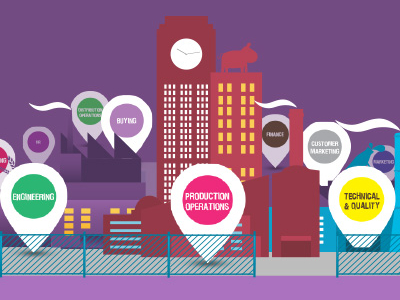What’s this job all about?
As an Environment Manager in Food Manufacturing you’ll be responsible for overseeing the environmental protection and sustainable production performance of your company.
You’ll develop, implement and monitor all company environmental strategies and ensure that policies and procedures always comply with relevant laws and current legislative requirements.
You’ll examine company procedures, identify and take forward improvements which enhance sustainable development and opportunities to reduce, re-use, and recycle.
You’ll be spreading the word about sustainability across your company and influencing company policy and behaviour - so strong communication skills are vital.
What might I be doing?
Environment Managers have an extremely varied workload and one that usually entails a range of strategic tasks:
- Developing and implementing environmental strategies and action plans that ensure sustainable corporate development
- Taking the lead on ensuring procurement of sustainable goods and services
- Coordinating all aspects of pollution control, waste management, recycling, environmental health, conservation and renewable energy
- Leading company implementation of environmental policies and practice
- Ensuring compliance with environmental legislation
- Auditing, analysing and reporting environmental performance to internal and external clients and regulatory bodies
- Carrying out impact assessments to identify, assess and reduce an organisation's environmental risks and financial costs
- Promoting and raising awareness of the impact of emerging environmental issues, whether legislative or best practice, on corporate, ethical and social responsibility at all levels of an organisation
- Managing development and implementation of an environmental management system
- Coordinating consultations on environmental matters
- Managing relations with the company’s Board, senior management and internal staff
- Training staff at all levels in environmental issues and responsibilities
- Negotiating environmental service agreements and managing associated costs and revenue
- Writing environmental reports & assuming lead responsibility for the company
- Leading on corporate social responsibility issues
What will be expected of me?
You’ll be expected to make sure that the company remains compliant with all relevant environmental legislation which is particularly important in the Food Manufacturing sector.
So although you’ll already be well qualified, you’ll be expected to stay right up to date with any changes to all relevant laws.
You’ll need to be well organised and be able to communicate effectively with your colleagues at all levels in the company.
You should be someone who approaches their work logically and analytically and be able to make quick, accurate judgements backed up with facts and information.
What can I expect?
There is no typical career path in Environment Management. Each post tends to be unique and progression depends on your employer but professional qualifications and continuous training are an integral part of career development.
The diverse nature of the profession offers opportunities to move into different areas of work in order to gain new skills and experience.
What qualifications do I need to get in?
To follow a career in Environment Management you’ll very probably have a degree in a relevant subject such as bioscience, environmental engineering, environmental health, environmental sciences or ecology. Additional qualifications are the norm with more than half of those employed in the environmental sector qualified at a post-graduate level.
However, if you’re already in, or aiming for the food sector, you could also switch into the environmental side of things with a food science or technology qualification.
Remember that many employers look for candidates with industry work experience so a relevant sandwich placement, for instance, might be very advantageous while studying.
What about further training?
Environment Managers always need to keep totally up to date with legislation, compliance and reporting requirements through training and continuous professional development (CPD).
Attending internal and external training courses, including relevant seminars and conferences, is an effective way of keeping up to date with current issues and refreshing knowledge. Some short courses can lead to further professional qualifications.
For future career development, you might want to consider gaining chartered status of a professional body.
Anything else I might need to know?
Yes – In many smaller firms you’ll find the role of environmental manager combined with that of either quality manager or health & safety manager - or possibly both!
So, the wider the range of skills you can demonstrate and the more versatile you can be, the better.
 cy
cy





